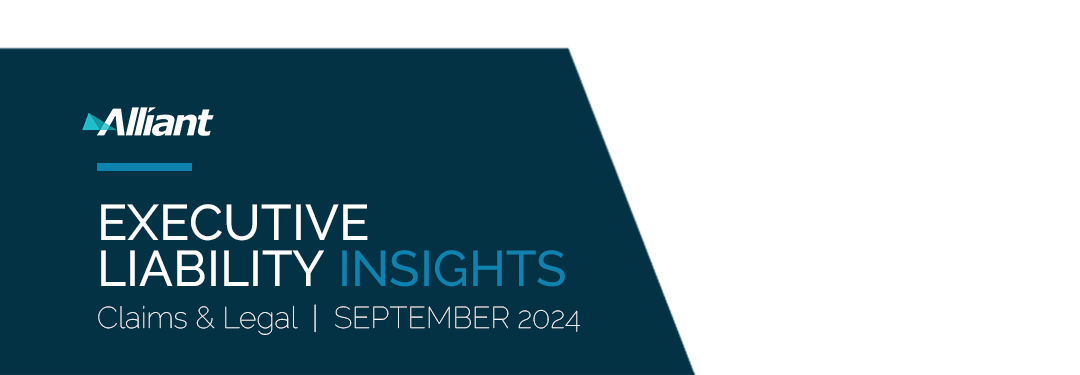
Navigating today’s complex risk environment can be a monumental task. Steve Shappell, Alliant Claims & Legal, spearheads Executive Liability Insights, a monthly review of news, legal developments and information on executive liability, cyber risk, employment practices liability, class action trends and more.


FEATURED ARTICLE
ARBITRATION PROVISION IN D&O INSURANCE POLICY DOES NOT APPLY TO DIRECTORS AND OFFICERS
Where an Arbitration Provision limits its application to the “policyholder,” other parties, such as directors, officers, and their assignees are not bound by that provision. In this case, the insured filed a voluntary petition under Chapter 11, which was followed by various adversary proceedings against the insured’s directors and officers.
In This Issue:
NETWORK-SECURITY INSURANCE CARRIER HAD A DUTY TO REIMBURSE AND DEFEND THE INSURED
Alticor Glob. Holdings v. Am. Int'l Specialty Lines Ins. Co., No. 22-1631 (6th Cir.; Aug. 23, 2024).
In its recent ruling, the Sixth Circuit Court of Appeals held that the insurer had inappropriately applied certain exclusions to bar coverage. The ruling stemmed from a settled copyright infringement litigation, in which a network-security carrier refused to defend and indemnify the insured. The insured filed suit alleging that the carrier had breached its insurance agreement.
Read More >>
EXCESS CARRIER HAD NO OBLIGATION TO PAY BASED ON ANTITRUST EXCLUSION AND EXHAUSTION
Beazley Ins. Co. v. Foster Poultry Farms, 2024 U.S. Dist. LEXIS 151122 (E.D. Cal.; Aug. 22, 2024).
A California federal court held that an excess carrier had no obligation to pay defense costs because the antitrust exclusion applied to all claims in the underlying litigation and, alternatively, the primary insurance policy had not been exhausted.
Read More >>
ILLINOIS AMENDS HUMAN RIGHTS ACT CREATING LIABILITY FOR EMPLOYERS’ USE OF AI
On August 9, 2024, Illinois Governor signed HB 3773, amending the Illinois Human Rights Act (the “Act”) regarding employers’ use of Artificial Intelligence (“AI”) and the potential for discrimination. The amendment focuses on “algorithmic discrimination” in AI programs employers may use when making certain employment decisions.
Read More >>
CIRCUIT COURT CONSIDERS WHETHER INSUREDS’ NOTICE WAS TIMELY UNDER NEW YORK CONTRACT STATUTE
Match Grp., LLC v. Beazley Underwriting Ltd., 2024 U.S. App. LEXIS 20317 (2d Cir.; Aug. 13, 2024).
The Second Circuit Court of Appeals reversed a lower court’s decision regarding timing of notice in favor of a major online dating company (the “Company”). In the underlying matter, the Company filed a lawsuit against its insurance carrier (the “Carrier”) seeking indemnity and defense following a settlement with a product developer for non-payment.
Read More >>
9TH CIRCUIT COURT OF APPEALS APPLIED “PURCHASER-SELLER RULE” TO BAR CLAIMS BROUGHT BY SPAC INVESTORS
Max Royal LLC v. Atieva, Inc., No. 23-16049, 2024 U.S. App. LEXIS 19910 (9th Cir.; Aug. 8, 2024).
Investors in a SPAC filed a securities class action alleging they were “duped” into purchasing shares prior to a planned merger and De-SPAC transaction involving a privately held automaker. The investors alleged that prior to the merger, the acquisition target’s CEO made false and misleading statements in relation to the automaker’s production capabilities and financial performance.
Read More >>
COURT REVIVES PRIVACY CLASS ACTION AGAINST A LEADING SEARCH ENGINE
Calhoun v. Google, LLC, No. 22-16993 (9th Cir.; Aug. 20, 2024).
The 9th Circuit Court of Appeals reversed a trial court’s ruling which granted the dismissal of a proposed privacy class action against the world’s leading search engine (the “Company”). This proposed lawsuit centered around the data collection practices of the Company’s browser and whether the browser’s users consented to the collection of their data.
Read More >>
CYBER CORNER
Click to read the following cases:
- INADVERTENT PUBLICATION OF PASSWORDS ADDS TO CONSUMER DATA BROKER’S WOES
Read More >>
EMPLOYMENT CORNER
Click to read the following cases:
- FTC’S FINAL NONCOMPETE RULE BLOCKED BY TEXAS FEDERAL COURT
Read More >>
SECURITIES CORNER
Click to read the following cases:
- SEC APPROVES NEW AND UPDATED PCAOB AUDITS STANDARDS
- THE SEC REITERATED ITS RECORDKEEPING REQUIREMENTS AND IT COST $390M DOLLARS TO TWENTY-SIX FIRMS
- SEC HOLDS INVESTMENT ADVISOR LIABLE FOR CRYPTO ASSET CUSTODY FAILURES
- NEW ANTI-MONEY LAUNDERING RULE FOR INVESTMENT ADVISERS
- AUGUST 2024 NOTEWORTHY ENFORCEMENT ACTIONS FILED
- AUGUST 2024 NOTEWORTHY SETTLEMENTS AND JUDGEMENTS
Read More >>
SHAREHOLDER CORNER
Click to read the following cases:
- AUGUST 2024 SECURITIES CLASS ACTION FILINGS
Read More >>
ARBITRATION PROVISION IN D&O INSURANCE POLICY DOES NOT APPLY TO DIRECTORS AND OFFICERS
Debtors v. Allied World Nat'l Assur. Co. (In re Orion Healthcorp, Inc.), 23-3849 (E.D.N.Y.; Sept. 5, 2024).


Where an Arbitration Provision limits its application to the “policyholder,” other parties, such as directors, officers, and their assignees are not bound by that provision.
In this case, the insured filed a voluntary petition under Chapter 11, which was followed by various adversary proceedings against the insured’s directors and officers. One of the proceedings involved an action brought by the Trustee against certain directors and officers, alleging breach of fiduciary duty and negligence claims.
The primary carrier, Hiscox, accepted coverage for the implicated “insured persons” under the Side-A insuring agreement within the policy and agreed to pay all covered loss. However, the excess carrier denied coverage pursuant to a prior acts exclusion in its policy. The insured mediated the matter and settled without the excess insurer. As part of the settlement, the directors and officers assigned their rights to pursue coverage under the excess policy to the Trustee.
Subsequently, the Trustee filed a complaint in bankruptcy court against the excess carrier seeking coverage. The excess carrier filed a motion to dismiss or stay the claims and compel arbitration, which was denied by the bankruptcy court. The excess carrier then appealed to the district court.
The district court reviewed the applicable arbitration provisions. The primary policy was subject to an arbitration provision which addressed resolutions of disputes between “the insurer and the policyholder.” The primary policy defined “policyholder” as “the organization.” Notably, the excess policy’s arbitration provision was deleted, and that provision specifically referenced the “insured” instead of the “policyholder.”
Given the policy language, the court noted that the directors and officers were not the “policyholder” and ruled that the arbitration clause did not apply to them. Moreover, the district court rejected the excess carrier’s argument, that the Trustee is the “policyholder” and noted that the Trustee was bringing its claims as an assignee. Furthermore, the court declined to broaden the definition of “policyholder” to include the Trustee and denied the excess carrier’s motion to compel arbitration.
The Takeaway
It should be noted that Side-A coverage, which is often implicated in bankruptcy proceedings, serves as the last resort of protection for individual directors and officers, as well as their personal assets. It is not uncommon for companies to invest extra premium into additional layers of protection for its individual directors and officers, when every other layer of protection fails. Therefore, an excess insurer denying Side-A coverage and pulling the parties into unnecessary coverage litigation (after the followed policy already contributed its limits) undermines confidence in the carrier’s ability to deliver the product they sell—the most personal, last-resort layer of insurance for individuals.
NETWORK-SECURITY INSURANCE CARRIER HAD A DUTY TO REIMBURSE AND DEFEND THE INSURED
Alticor Glob. Holdings v. Am. Int'l Specialty Lines Ins. Co., No. 22-1631 (6th Cir.; Aug. 23, 2024).


In its recent ruling, the Sixth Circuit Court of Appeals held that the insurer had inappropriately applied certain exclusions to bar coverage. The ruling stemmed from a settled copyright infringement litigation, in which a network-security carrier refused to defend and indemnify the insured. The insured filed suit alleging that the carrier had breached its insurance agreement. Previously, the carrier was ordered by a lower court to pay the insured millions for its defense costs along with prejudgment interest.
Here, the appellate court’s partially divided panel found that neither the prior and pending exclusion nor the relatedness exclusion in the insurance agreement barred coverage. Specifically, the court disagreed with the carrier’s assertion that any potential coverage was barred because the claim arose out of prior litigation concerning the insured’s use of copyrighted music. The court held that this litigation, which dated back nearly three-decades, was not related to the present copyright infringement lawsuit because the two lawsuits alleged different types of copyrighted material, occurred in different time periods, and involved different technology. The prior lawsuit also alleged different forms of infringement and were not connected by a “causal link.”
Additionally, the appellate court held that the “other insurance” provision in the agreement did not require the insured’s general liability policies (held with a different carrier) to be exhausted before the carrier was required to step in. The policies operated as a form of self-insurance for the insured, thus, making them fronting policies which were not collectible. Ultimately, the appellate court affirmed the district court’s ruling and ordered the carrier to pay millions in defense costs to its insured.
EXCESS CARRIER HAD NO OBLIGATION TO PAY BASED ON ANTITRUST EXCLUSION AND EXHAUSTION
Beazley Ins. Co. v. Foster Poultry Farms, 2024 U.S. Dist. LEXIS 151122 (E.D. Cal.; Aug. 22, 2024).


A California federal court held that an excess carrier had no obligation to pay defense costs because the antitrust exclusion applied to all claims in the underlying litigation and, alternatively, the primary insurance policy had not been exhausted. The dispute at issue was whether an excess carrier was obligated to pay defense costs arising from a class action litigation alleging that poultry farmers illegally fixed the price of chicken. The underlying litigation included violations of federal and state antitrust laws, state consumer protection, and unfair competition laws, as well as unjust enrichment "by the receipt of unlawfully inflated prices and unlawful profits of Broilers."
The followed policy included an antitrust exclusion stating: “The [carrier] shall not be liable to make any payment for Loss in connection with any Claim made against an Insured: ... for any actual or alleged violation of any law, whether statutory, regulatory or common law, respecting any of the following activities: antitrust, business competition, unfair trade practices or tortious interference in another's business or contractual relationships.” Based on this exclusion, the primary and excess carriers denied coverage. Subsequently, the primary carrier and the insured mediated their coverage dispute over the application of the exclusion resulting in the primary carrier agreeing to pay 45% of defense costs subject to a cap in exchange for a release.
Coverage under the Excess Policy attached "only after all of the Underlying Limits have been exhausted through payments by, or on behalf of, or in place of the insurers of the Underlying Insurance [i.e., the Followed Policy] of amounts covered under the Underlying Insurance." The excess carrier sued seeking a declaratory judgment that (1) the Excess Policy excluded coverage for antitrust claims; and, alternatively, (2) the limits of the primary policy had not been exhausted.
The insured argued the exclusion did not bar coverage because many of the cases consolidated in the litigation included causes of action for unjust enrichment and violations of state consumer protection laws, along with allegations of fraud and false advertising, which did not concern antitrust. Despite courts generally narrowly construing exclusions, the court found that these claims were “derivative of, and entirely dependent upon, the antitrust claims,” and the exclusion applied to all claims in the underlying litigation.
Further, the court determined that even if the antitrust exclusion did not apply to all the claims, the excess insurer would still owe no duty to advance defense costs because the primary layer of insurance had not been exhausted. The primary carrier’s payments were capped, and the court held that payments made by the insured beyond the cap were not considered payments of "amounts covered" "on behalf of" or "in place of" the primary carrier for the purposes of exhaustion.
ILLINOIS AMENDS HUMAN RIGHTS ACT CREATING LIABILITY FOR EMPLOYERS’ USE OF AI


On August 9, 2024, Illinois Governor signed HB 3773, amending the Illinois Human Rights Act (the “Act”) regarding employers’ use of Artificial Intelligence (“AI”) and the potential for discrimination. The amendment focuses on “algorithmic discrimination” in AI programs employers may use when making certain employment decisions.
Under HB 3773, an employer cannot use AI that effectively discriminates against employees with respect to, recruitment, hiring, promotions, discharge, discipline, or the terms, privileges, or conditions of employment. In addition, the Act prohibits employers from using zip codes as a proxy for protected classes. Illinois employers must notify employees of the use of AI to make or aid in making employment-related decisions. HB 3773 applies to any person employing one or more employees within Illinois.
An employee alleging a violation of the AI provisions in HB 3773 must first file a complaint with the Illinois Department of Human Rights (the “IDHR”). Within 100 days of the filing, the IDHR will determine if there is substantial evidence to support that the alleged violation occurred. If not, the charge will be dismissed, but the aggrieved party can seek review of the dismissal before the Illinois Human Rights Commission (the “Commission”). However, if the IDHR does determine there is substantial evidence of a violation, the IDHR must file a complaint with the Commission. When a complaint is filed with the Commission, any party may elect to have the claim decided in an Illinois circuit court within 20 days of receiving the complaint. Available remedies include actual damages, civil penalties, attorneys’ fees, compliance reporting obligations, and any other action as may be necessary to make the complainant whole.
CIRCUIT COURT CONSIDERS WHETHER INSUREDS’ NOTICE WAS TIMELY UNDER NEW YORK CONTRACT STATUTE
Match Grp., LLC v. Beazley Underwriting Ltd., 2024 U.S. App. LEXIS 20317 (2d Cir.; Aug. 13, 2024).


The Second Circuit Court of Appeals reversed a lower court’s decision regarding timing of notice in favor of a major online dating company (the “Company”). In the underlying matter, the Company filed a lawsuit against its insurance carrier (the “Carrier”) seeking indemnity and defense following a settlement with a product developer for non-payment. In its denial, the Carrier argued that the Company’s notice of the suit was untimely under the policy. Therefore, according to the Carrier it was under no contractual obligation to cover any defense costs.
The court relied on the policy’s definition of a “Claim” as well as state statutes governing insurance contracts in deciding whether the Company’s notice was submitted within the applicable policy period. The court focused on an initial demand letter (the “letter”) sent by the product developer and held it was relevant to its timeliness analysis as it led to the filing of the developer’s suit against the Company. The Company was made aware of the suit the day after it was filed and subsequently asked its insurance brokers to notice the claim to the Carrier. At issue here, was that this request for notice was given on a Friday, and the Policy Period was set to expire that weekend. Notice was submitted to the Insurer the following Monday and was deemed untimely.
The court ordered reconsideration based on a New York statute regarding insurance contracts that allows for an extension of time to the following business day when a contractual performance is required on a weekend. The statute allowed a party seeking enforcement on a specified hour on the extended business day if a specific hour of performance was in original contract. The Carrier argued that, if the statute applied to its policy, notice would still have been untimely because notice was given hours after the specified time laid out in the policy period. However, the Company argued that the statute granted it an extension to notice the claim at any time on that following business day. The lower court must now reconsider which part of the statute it will use to determine timeliness.
9TH CIRCUIT COURT OF APPEALS APPLIED “PURCHASER-SELLER RULE” TO BAR CLAIMS BROUGHT BY SPAC INVESTORS
Max Royal LLC v. Atieva, Inc., No. 23-16049, 2024 U.S. App. LEXIS 19910 (9th Cir.; Aug. 8, 2024).


Investors in a SPAC filed a securities class action alleging they were “duped” into purchasing shares prior to a planned merger and De-SPAC transaction involving a privately held automaker. The investors alleged that prior to the merger, the acquisition target’s CEO made false and misleading statements in relation to the automaker’s production capabilities and financial performance. The SPAC investors further alleged the misrepresentations materially affected the stock price of the de-SPAC entity and, thus, dramatically reduced the value of their investment.
At the initial motion to dismiss stage, the federal trial court held that the shareholders failed to plead materiality and dismissed the case. The shareholders appealed.
The Ninth Circuit affirmed the dismissal but based their decision on a different legal theory—standing to sue. Generally, the standing doctrine refers to a given party’s capacity to bring a case in court. Here, the Court relied on a U.S. Supreme Court case which confined Section 10(b) standing to the “purchasers or sellers of the stock in question,” known as the “purchaser-seller rule.” Under this bright-line rule, the stock in question is “the security to which the prospectus, representation, or omission relates.” In this case, the stock in question would be the acquisition target, the automaker.
The Ninth Circuit also noted a prior ruling from the Second Circuit held that purchasers of a security of an acquiring company do not have standing to file a securities fraud case against the target company for alleged misstatements the target company made prior to the merger. The court rejected the plaintiffs’ contention that they had standing to sue because there was a sufficient direct relationship between the target’s alleged misstatements and the price of the acquirer’s shares.
In the subject case, the Ninth Circuit noted that it is “undisputed” that the alleged misrepresentations concerned the automaker’s securities. Because the Investors did not purchase or sell the automaker’s stock, the Investors lacked standing under federal securities law. The fact that the SPAC later acquired the automaker did not change the analysis noting that there is no exception for SPACs.
COURT REVIVES PRIVACY CLASS ACTION AGAINST A LEADING SEARCH ENGINE
Calhoun v. Google, LLC, No. 22-16993 (9th Cir.; Aug. 20, 2024).


The 9th Circuit Court of Appeals reversed a trial court’s ruling which granted the dismissal of a proposed privacy class action against the world’s leading search engine (the “Company”). This proposed lawsuit centered around the data collection practices of the Company’s browser and whether the browser’s users consented to the collection of their data.
The lawsuit alleged violations of the California Invasion of Privacy Act and various other state and federal data privacy laws. The appellate court reversed the previous dismissal of the lawsuit, holding that the lower court had used the wrong standard in determining what a reasonable browser user would expect the Company to do with their collected data. The appellate court explained that the Company’s privacy disclosures were too convoluted for most users to understand. Specifically, the court ruled that based on the browser’s privacy policy, reasonable users would not expect the Company to collect browsing data when they are not signed into their accounts. Here, the court found that a reasonable user would not have expected such information to be shared.
This ruling should encourage companies who deal with the public online to implement and review their privacy policies. Based on the court’s decision, this privacy policy must be simple enough for a reasonable user to understand. Privacy policies should clearly state how user data will be collected and what this data will be used for.
Companies also should revisit their respective Cyber insurance policies and ensure that the definition of a “privacy wrongful act” is broadly written and includes allegations against the insured company for violation of its own privacy policies. Lastly, insureds should be aware of any potential exclusions for claims arising from the wrongful collection of data. If it is not possible to remove these exclusions altogether, insureds should attempt to negotiate carve backs to cover defense costs.
Cyber Corner
INADVERTENT PUBLICATION OF PASSWORDS ADDS TO CONSUMER DATA BROKER’S WOES
As reported by multiple news outlets, a consumer data broker who recently leaked the personal information of a large swath of the American public online has also inadvertently published passwords allowing hackers to access its database.
Employment Corner
FTC’S FINAL NONCOMPETE RULE BLOCKED BY TEXAS FEDERAL COURT
Ryan LLC v. FTC, 2024 U.S. Dist. LEXIS 148488 (N.D. Tex.; Aug. 20, 2024).
A Texas federal court set aside the Federal Trade Commission (the “FTC”) final rule that would ban nearly all post-employment noncompete agreements. The rule was set to go into effect in the coming weeks. The court found that the rule exceeded the FTC’s statutory authority and, therefore, vacated the rule’s implementation nationwide.
Securities Corner
SEC APPROVES NEW AND UPDATED PCAOB AUDITS STANDARDS
Recently, the SEC approved a new PCAOB standard, AS 1000, which redefined the foundational standards for auditors, as well as amended existing PCAOB audit standards (AS1105 and AS2301) to address use of technology-assisted analysis. Additionally, the SEC approved changes to the PCAOB's contributory liability rule (Rule 3502) to limit those who directly and substantially contributed to a firms’ violation from a recklessness standard to a negligence standard.
THE SEC REITERATED ITS RECORDKEEPING REQUIREMENTS AND IT COST $390M TO TWENTY-SIX FIRMS
Recently, the SEC announced that 26 dually registered broker-dealers and investment advisers have agreed to pay combined almost $400 million in penalties to settle charges related to recordkeeping failures related to off-channel communications.
SEC HOLDS INVESTMENT ADVISOR LIABLE FOR CRYPTO ASSET CUSTODY FAILURES
Earlier this month, the SEC charged and imposed a hefty civil penalty against an investment adviser (the “Advisor”) who failed to properly safeguard its clients’ assets. In the charge, the SEC alleged that the Adviser violated the SEC’s Investment Advisers Act (the “Act”), which requires that investment advisers who have custody over client funds, must hold those funds with a qualified custodian like a bank or broker-dealer.
NEW ANTI-MONEY LAUNDERING RULE FOR INVESTMENT ADVISERS
Recently, the Financial Crimes Enforcement Network (FinCEN) issued the Anti-Money Laundering/Countering the Financing of Terrorism Program and Suspicious Activity Report Filing Requirements for Registered Investment Advisers and Exempt Reporting Advisers (the “New Rule”).
Source: Stanford Law School Securities Class Action Clearinghouse
ABOUT ALLIANT INSURANCE SERVICES
Alliant Insurance Services is the nation’s leading specialty broker. In the face of increasing complexity, our approach is simple: hire the best people and invest extensively in the industries and clients we serve. We operate through national platforms to all specialties. We draw upon our resources from across the country, regardless of where the resource is located.
Contributors


Abbe Darr, Esq.
Claims Attorney
abbe.darr@alliant.com
David Finz, Esq.
Claims Attorney
david.finz@alliant.com
Isabel Arustamyan, Esq.
Claims Attorney
isabel.arustamyan@alliant.com
Jacqueline Vinar, Esq.
Claims Attorney
jacqueline.vinar@alliant.com
Jaimi Berliner, Esq.
Claims Attorney
jaimi.berliner@alliant.com
Karina Montoya, J.D.
Claims Advocate
karina.montoya@alliant.com
Malia Shappell, Esq.
Claims Attorney
malia.shappell@alliant.com
Michael Radak, Esq.
Claims Attorney
michael.radak@alliant.com
Naomi Egwakhide Oghuma, J.D.
Claims Advocate
naomi.egwakhideoghuma@alliant.com
Peter Kelly, Esq.
Claims Attorney
peter.kelly@alliant.com
Robert Aratingi
Senior Claims Advocate
robert.aratingi@alliant.com
Steve Levine, Esq.
Claims Attorney
slevine@alliant.com